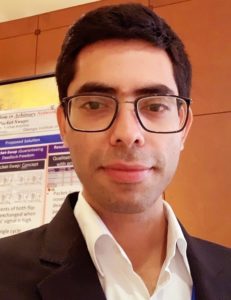Friday, March 25, 2022
4:10 – 5:00 p.m.
ETB 1020 – *In-person* (Emerging Technologies Building)
Dr. Mayank Parasar
Samsung Austin R&D Center (SARC) in Austin, TX
Title: “Subactive Techniques for Guaranteeing Routing and Protocol Deadlock Freedom in Interconnection”
Talking Points:
-
- Correctness is of paramount concern in interconnection networks. (Routing and Protocol) Deadlock freedom is a cornerstone of correctness.
- Prior solutions either over-provision the network or incur performance penalty to provide deadlock freedom
- We propose new set of unified techniques to resolve routing and protocol deadlocks
Abstract
Interconnection networks are the communication backbone for any system. They occur at various scales: from on-chip networks, for example 2.5D/chiplet networks, between processing cores, to supercomputers between compute nodes, to data centers between high-end servers. One of the most fundamental challenges in an interconnection network is that of deadlocks. Deadlocks can be of two types: routing level deadlocks and protocol level deadlocks. Routing level deadlocks occur because of cyclic dependency between packets trying to acquire buffers, whereas protocol level deadlock occurs because the response message is stuck indefinitely behind the queue of request messages. Both kinds of deadlock render the forward movement of packets impossible leading to complete system failure.
Prior work either restricts the path that packets take in the network or provisions an extra set of buffers to resolve routing level deadlocks. For protocol level deadlocks, separate sets of buffers are reserved at every router for each message class. Naturally, proposed solutions either restrict the packet movement resulting in lower performance or require higher area and power.
We propose a new set of efficient techniques for providing both routing and protocol level deadlock freedom. Our techniques provide periodic forced movement to the packets in the network, which breaks any cyclic dependency of packets. Breaking this cyclic dependency results in resolving routing level deadlocks. Moreover, because of periodic forced movement, the response message is never stuck indefinitely behind the queue of request messages; therefore, our techniques also resolve protocol level deadlocks. We use the term ‘subactive’ for these new class of techniques.
Biography:
Dr. Mayank parasar works at Samsung Austin R&D Center (SARC) in Austin, TX. Mayank Parasar has received his Ph.D. from the School of Electrical and Computer Engineering at Georgia Institute of Technology. He received an M.S. in Electrical and Computer Engineering from Georgia Tech in 2017 and a B.Tech. in Electrical Engineering department from Indian Institute of Technology (IIT) Kharagpur in 2013.
He works in computer architecture with the research focus on proposing breakthrough solutions in the field of interconnection networks, memory system and system software/application layer co-design. His dissertation, titled Subactive Techniques for Guaranteeing Routing and Protocol Deadlock Freedom in Interconnection Networks, formulates techniques that guarantee deadlock freedom with a significant reduction in both area and power budget.
He held the position of AMD Student Ambassador at Georgia Tech in the year 2018-19. He received the Otto & Jenny Krauss Fellow award in the year 2015-16.

In-Person @ ETB 1020 @ 4:10 p.m. on Friday, 3/11/22
